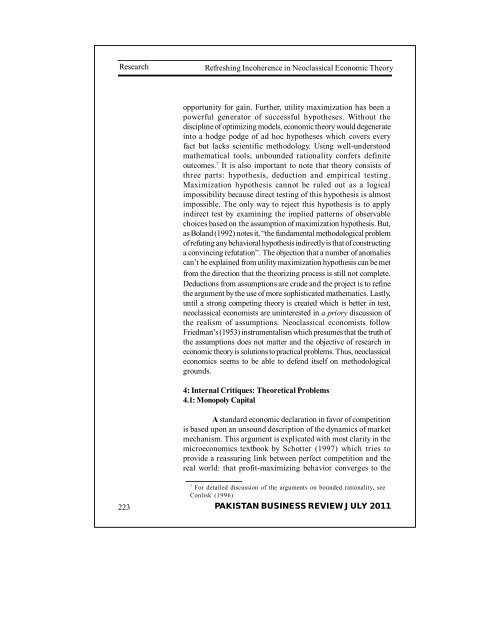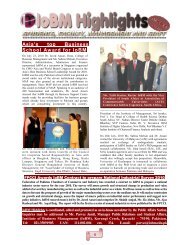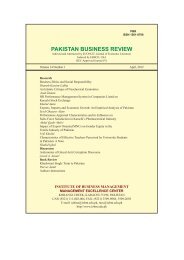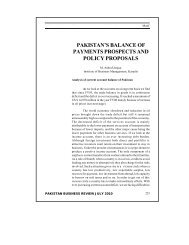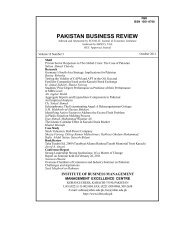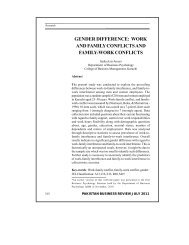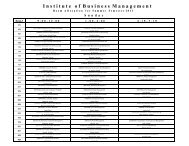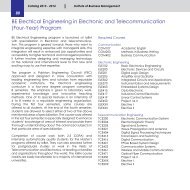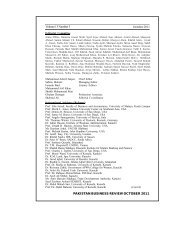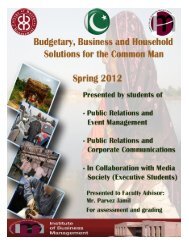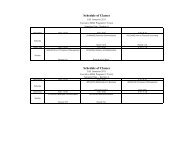PAKISTAN BUSINESS REVIEW - Institute of Business Management
PAKISTAN BUSINESS REVIEW - Institute of Business Management
PAKISTAN BUSINESS REVIEW - Institute of Business Management
Create successful ePaper yourself
Turn your PDF publications into a flip-book with our unique Google optimized e-Paper software.
Research<br />
Refreshing Incoherence in Neoclassical Economic Theory<br />
opportunity for gain. Further, utility maximization has been a<br />
powerful generator <strong>of</strong> successful hypotheses. Without the<br />
discipline <strong>of</strong> optimizing models, economic theory would degenerate<br />
into a hodge podge <strong>of</strong> ad hoc hypotheses which covers every<br />
fact but lacks scientific methodology. Using well-understood<br />
mathematical tools, unbounded rationality confers definite<br />
outcomes. 7 It is also important to note that theory consists <strong>of</strong><br />
three parts: hypothesis, deduction and empirical testing.<br />
Maximization hypothesis cannot be ruled out as a logical<br />
impossibility because direct testing <strong>of</strong> this hypothesis is almost<br />
impossible. The only way to reject this hypothesis is to apply<br />
indirect test by examining the implied patterns <strong>of</strong> observable<br />
choices based on the assumption <strong>of</strong> maximization hypothesis. But,<br />
as Boland (1992) notes it, “the fundamental methodological problem<br />
<strong>of</strong> refuting any behavioral hypothesis indirectly is that <strong>of</strong> constructing<br />
a convincing refutation”. The objection that a number <strong>of</strong> anomalies<br />
can’t be explained from utility maximization hypothesis can be met<br />
from the direction that the theorizing process is still not complete.<br />
Deductions from assumptions are crude and the project is to refine<br />
the argument by the use <strong>of</strong> more sophisticated mathematics. Lastly,<br />
until a strong competing theory is created which is better in test,<br />
neoclassical economists are uninterested in a priory discussion <strong>of</strong><br />
the realism <strong>of</strong> assumptions. Neoclassical economists follow<br />
Friedman’s (1953) instrumentalism which presumes that the truth <strong>of</strong><br />
the assumptions does not matter and the objective <strong>of</strong> research in<br />
economic theory is solutions to practical problems. Thus, neoclassical<br />
economics seems to be able to defend itself on methodological<br />
grounds.<br />
4: Internal Critiques: Theoretical Problems<br />
4.1: Monopoly Capital<br />
A standard economic declaration in favor <strong>of</strong> competition<br />
is based upon an unsound description <strong>of</strong> the dynamics <strong>of</strong> market<br />
mechanism. This argument is explicated with most clarity in the<br />
microeconomics textbook by Schotter (1997) which tries to<br />
provide a reassuring link between perfect competition and the<br />
real world: that pr<strong>of</strong>it-maximizing behavior converges to the<br />
223<br />
7<br />
For detailed discussion <strong>of</strong> the arguments on bounded rationality, see<br />
Conlisk (1996)<br />
<strong>PAKISTAN</strong> <strong>BUSINESS</strong> <strong>REVIEW</strong> JULY 2011


